
Washington, D.C., April 14, 2025 – As El Salvador’s President Nayib Bukele arrives at the White House today for an official working visit, Harvard constitutional law professor Laurence Tribe has called on him to bring Elmer Garcia, a recently deported Guatemalan migrant, and “return the ransom he collected for enslaving that lawlessly seized innocent man.” Tribe’s April 13 social media post reflects growing criticism of U.S. deportation practices and Bukele’s role in them.
Elmer Garcia, 35, was deported to El Salvador on April 10 despite living in the U.S. for 15 years and having a pending asylum claim. According to The Washington Post, a clerical error led to his deportation to El Salvador instead of Guatemala, prompting the American Immigration Council to argue that his due process rights were violated. Tribe’s reference to “ransom” suggests Bukele’s government may have demanded payments or concessions for deportees processed under U.S.-El Salvador agreements, though no evidence confirms this in Garcia’s case.
Bukele’s visit, announced on April 9 by the State Department, aims to address immigration, gang violence, and economic ties between the U.S. and El Salvador. Bukele has been a polarizing figure—praised for reducing crime in El Salvador but criticized for authoritarian tactics, including mass detentions of suspected gang members. Tribe’s call highlights broader tensions over the Trump administration’s mass deportation policies, which have intensified since a January 2025 national emergency declaration at the southern border. Critics argue these policies, including agreements with countries like El Salvador to process deportees, lack transparency and fairness.
Public reaction on X is divided. Some users support Tribe’s stance, labeling Garcia’s deportation “inhumane” and urging Bukele to intervene, while others defend the deportation, arguing Garcia should not have been in the U.S. illegally. As of April 14, Garcia’s whereabouts in El Salvador remain unclear, and neither Bukele nor the White House has responded to Tribe’s suggestion. The visit proceeds amid ongoing legal challenges to U.S. deportation practices, with advocates pushing for Garcia’s return to address the error in his case.
Tribe’s provocative statement underscores the contentious intersection of U.S. immigration policy and international cooperation, raising questions about accountability and human rights in deportation processes. As Bukele meets with Trump, Garcia’s case remains a focal point for critics of the administration’s hardline approach.

